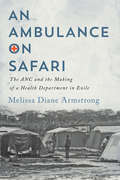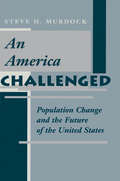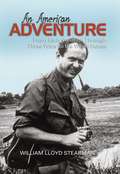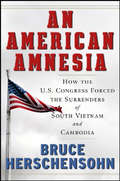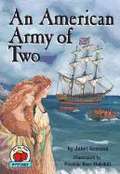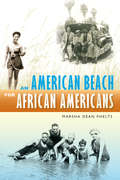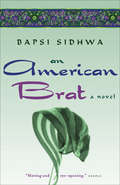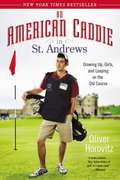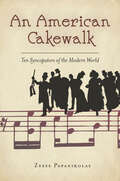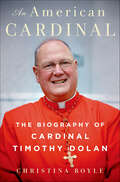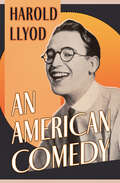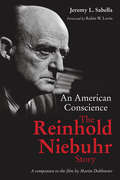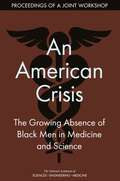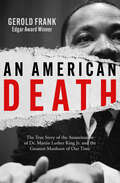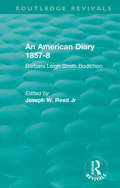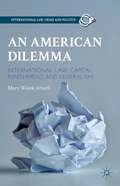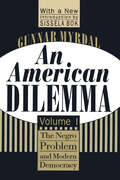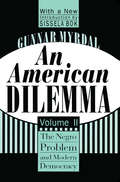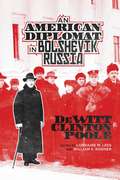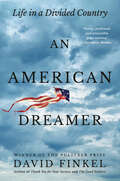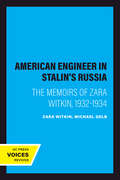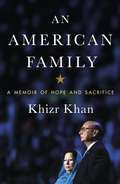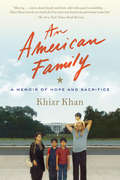- Table View
- List View
An Ambulance on Safari: The ANC and the Making of a Health Department in Exile (McGill-Queen's/Associated Medical Services Studies in the History of Medicine, Health, and Society #53)
by Melissa Diane ArmstrongDuring the apartheid era, thousands of South African political activists, militants, and refugees fled arrest by crossing into neighbouring southern African countries. Although they had escaped political oppression, many required medical attention during their period of exile. An Ambulance on Safari describes the efforts of the African National Congress (ANC) to deliver emergency healthcare to South African exiles and, in the same stroke, to establish political legitimacy and foster anti-apartheid sentiment on an international stage. Banned in South Africa from 1960 to 1990, the ANC continued its operations underground in anticipation of eventual political victory, styling itself as a "government in waiting." In 1977 it created its own Health Department, which it presented as an alternative medical service and the nucleus of a post-apartheid healthcare system. By publicizing its own democratic policies as well as the racist practices of healthcare delivery in South Africa, the Health Department won international attention for its cause and provoked widespread condemnation of the apartheid state. While the global campaign was unfolding successfully, the department's provision of healthcare on the ground was intermittent as patients confronted a fledgling medical system experiencing various growing pains. Still, the legacy of the department would be long, as many medical professionals who joined the post-apartheid Department of Health in South Africa had been trained in exile during the liberation struggle. With careful attention to both the international publicity campaign and on-the-ground medical efforts, An Ambulance on Safari reveals the intricate and significant political role of the ANC's Health Department and its influence on the anti-apartheid movement.
An America Challenged: Population Change and the Future of the United States
by Steve H MurdockThis study looks at the implications of demographic changes in the USA for business, government and the public. Using up-to-date census information, the author provides a brief historical overview of recent demographic change in the USA and explains the effects of population patterns.
An American Adventure
by William Lloyd StearmanA memoir of extraordinary scope, William Lloyd Stearman's reminiscences will attract those interested in early aviation, World War II in the Pacific, life as a diplomat behind the Iron Curtain, the Vietnam War, and the ins and outs of national security decision making in the White House. Stearman begins with a description of his childhood as the son of aviation pioneer Lloyd Stearman. He then covers his naval combat experiences in the Pacific War and later struggles as one of the Navy's youngest ship captains. Following graduate school, he moved to the front lines of the Cold War and writes about his life as a diplomat who negotiated with the Soviets, spent nine years in Berlin and Vienna, and was director of psychological operations against North Vietnam. His reflections on seventeen years with the National Security Council at the White House are of special interest.
An American Amnesia: How the US Congress Forced the Surrenders of South Vietnam and Cambodia
by Bruce HerschensohnJanuary 27th, 1973: the United States, South Vietnam, North Vietnam, and the Viet Cong sign the Paris Peace Accords, guaranteeing the right of self-determination to the South Vietnamese people.April 30th, 1975: President Duong Van Minh of South Vietnam announces the nation's unconditional surrender to the North, ending the decade-long conflict and enabling the merger of both countries into the Socialist Republic of Vietnam.What happened in two short years to cause such a dramatic reversal?In An American Amnesia, respected political commentator Bruce Herschensohn re-examines the incredible actions taken by the 94th Congress and by many American citizens which forced South Vietnam's surrender, an event that brought about immense tragedy for Southeast Asians and haunts our political landscape to this day. Drawing on notes, speeches, and writings from his own experiences in Southeast Asia, as well as in the United States Information Agency and in the White House, Herschensohn fills in important facts in that period of history and warns against the danger of succumbing to a similar voluntary amnesia in the future.
An American Army of Two
by Janet Greeson Patricia MulvihillThe war of 1812 is raging, and from the lighthouse where their father works, Rebecca Bates and her sister Abigail can see a British ship coming. But the American troops are nowhere near! Rebecca and Abigail go the rescue--to become an American army of two--in this adventure-filled tale based on the true story of two young women who turned the tables on the mighty British army.
An American Beach for African Americans
by Marsha Dean PheltsIn the only complete history of Florida’s American Beach to date, Marsha Dean Phelts draws together personal interviews, photos, newspaper articles, memoirs, maps, and official documents to reconstruct the character and traditions of Amelia Island’s 200-acre African American community. In its heyday, when other beaches grudgingly provided only limited access, black vacationers traveled as many as 1,000 miles down the east coast of the United States and hundreds of miles along the Gulf coast to a beachfront that welcomed their business.Beginning in 1781 with the Samuel Harrison homestead on the southern end of Amelia Island, Phelts traces the birth of the community to General Sherman’s Special Field Order No. 15, in which the Union granted many former Confederate coastal holdings, including Harrison’s property, to former slaves. She then follows the lineage of the first African American families known to have settled in the area to descendants remaining there today, including those of Zephaniah Kingsley and his wife, Anna Jai.Moving through the Jim Crow era, Phelts describes the development of American Beach’s predecessors in the early 1900s. Finally, she provides the fullest account to date of the life and contributions of Abraham Lincoln Lewis, the wealthy African American businessman who in 1935, as president of the Afro-American Life Insurance Company, initiated the purchase and development of the tract of seashore known as American Beach. From Lewis’s arrival on the scene, Phelts follows the community’s sustained development and growth, highlighting landmarks like the Ocean-Vu-Inn and the Blue Palace and concluding with a stirring plea for the preservation of American Beach, which is currently threatened by encroaching development.In a narrative full of firsthand accounts and "old-timer" stories, Phelts, who has vacationed at American Beach since she was four and now lives there, frequently adopts the style of an oral historian to paint what is ultimately a personal and intimate portrait of a community rich in heritage and culture.
An American Bestiary
by Jack SchaeferIn a series of leisurely and loving portraits, Jack Schaefer describes a whole ark-full of creatures great and small, who mostly live beyond the din of traffic and the glare of city lights, from the industrious pika, whose sophisticated stockpiling permits him to live in comfort on the desolate rockslides of the high Rockies, to the magnificent pronghorn, whose very appearance represents a perfection of successful adaptation. The book is packed with a thousand bits of information, much of it surely unfamiliar even to the well-read naturalist: the special conditions of a bat's pregnancy, the subterranean architecture of the gopher, the seasonal frustrations of the stolid porcupine. But more important is the overall warmth and geniality of the author's vision--one would like to call it his humanity, but, alas, at the present stage of our development "animality" seems a more appropriate word. In any case, the reader will end up a better mammal, and perhaps even a wiser and more understanding human being.
An American Brat
by Bapsi SidhwaFeroza Ginwalla, a pampered, protected 16-year-old Pakistani girl, is sent to America by her parents, who are alarmed by the fundamentalism overtaking Pakistan — and their daughter. Hoping that a few months with her uncle, an MIT grad student, will soften the girl’s rigid thinking, they get more than they bargained for: Feroza, enthralled by American culture and her new freedom, insists on staying. A bargain is struck, allowing Feroza to attend college with the understanding that she will return home and marry well. As a student in a small western town, Feroza’s perceptions of America, her homeland, and herself begin to alter. When she falls in love with and wants to marry a Jewish American, her family is aghast. Feroza realizes just how far she has come — and wonders how much further she can go. This delightful coming-of-age novel is both remarkably funny and a remarkably acute portrayal of America as seen through the eyes of a perceptive young immigrant.
An American Caddie in St. Andrews
by Oliver HorovitzA hilarious and poignant memoir of a Harvard student who comes of age as a caddie on St. Andrews’s fabled Old Course. In the middle of Oliver Horovitz’s high school graduation ceremony, his cell phone rang: It was Harvard. He’d been accepted, but he couldn’t start for another year. A caddie since he was twelve and a golfer sporting a 1. 8 handicap, Ollie decides to spend his gap year in St. Andrews, Scotland—a town with the U. K. ’s highest number of pubs per capita, and home to the Old Course, golf ’s most famous eighteen holes—where he enrolls in the St. Andrews Links Trust caddie trainee program. Initially, the notoriously brusque veteran caddies treat Ollie like a bug. But after a year of waking up at 4:30 A. M. every morning and looping two rounds a day, Ollie earns their grudging respect— only to have to pack up and leave for Harvard. There, Ollie’s new classmates are the sons of Albania’s UN ambassador, the owner of Heineken, and the CEO of Goldman Sachs. Surrounded by sixth generation legacies, he feels like a fish out of water all over again and can’t wait to get back to St. Andrews. Even after graduation, when his college friends rush to Wall Street, Horovitz continues to return each summer to caddie on the Old Course. A hilarious, irresistible, behind-the-scenes peek at the world’s most celebrated golf course—and its equally famous caddie shack—An American Caddie in St. Andrews is certain to not only entertain golfers and fans of St. Andrews but also anyone who dares to remember stumbling into adulthood and finding one’s place in the world. .
An American Cakewalk: Ten Syncopators of the Modern World
by Zeese PapanikolasThe profound economic and social changes in the post-Civil War United States created new challenges to a nation founded on Enlightenment and transcendental values, religious certainties, and rural traditions. Newly-freed African Americans, emboldened women, intellectuals and artists,and a polyglot tide of immigrants found themselves in a restless new world of railroads, factories, and skyscrapers where old assumptions were being challengedand new values had yet to be created. InAn American Cakewalk: Ten Syncopators of the Modern World, Zeese Papanikolas tells the lively and entertaining story of a diverse group of figures in the arts and sciences who inhabited this new America. Just as ragtime composers subverted musical expectations by combining European march timing with African syncopations, so this book's protagonists--who range from Emily Dickinson toThorstein Veblen and from Henry and William James to Charles Mingus--interrogated the modern American world through their own "syncopations" of cultural givens. The old antebellum slave dance, the cakewalk, with its parody of the manners and pretensions of the white folks in the Big House, provides a template of how the tricksters, shamans, poets, philosophers, ragtime pianists, and jazz musicians who inhabit this book used the arts of parody, satire, and disguise to subvert American cultural norms and to create new works of astonishing beauty and intellectual vigor.
An American Cardinal: The Biography of Cardinal Timothy Dolan
by Christina BoyleThe most powerful Roman Catholic leader in the United States had humble beginnings. Timothy Michael Dolan was born in Maplewood, Missouri in 1950. From an early age, those around him knew that he would become a priest. Through college and seminary, his power and spirituality grew. He was formally ordained in 1976. In 2009, he was made Archbishop of New York. Several months later he was elevated to cardinal. There were clear signs that the ailing Pope Benedict XVI saw him as a bright hope for the future. During the 2013 conclave, Vatican experts seriously wondered if he would be chosen to lead the Catholics of the world. The cardinal's rise is not, however, without its controversies. He was one of the Catholic leaders who dealt, harshly say some, with abusers and the abused in the church's sex scandal. He is a consummate player who doesn't shy away from picking a political battle. Christina Boyle's An American Cardinal is a book about power and the Roman Catholic church today framed by the life of a man who might someday become the first American pope.
An American Comedy
by Harold Lloyd Wesley W. StoutThis autobiography by an influential silent film star gives an insider&’s view of the motion picture industry in the early twentieth century. It&’s one of the most enduring images in film history: a young man in circular glasses, dangling from the hands of a clock high above Los Angeles. The actor performing this daring stunt was Harold Lloyd, a highly successful comedian from the silent film era. Lloyd made nearly two hundred comedies, both silent and &“talkies,&” between 1914 and 1947. He is best known for his &“Glass&” character, a bespectacled everyman who captured the mood of the 1920s. In this fascinating autobiography, which was written just around the time sound was revolutionizing cinema, Lloyd chronicles his experiences as a performer and producer of silent films, preserving firsthand details of Hollywood&’s bygone period. This extraordinary memoir, originally published in 1928, discusses actors both comedic and dramatic, stage to film adaptations, producers, directors, and primarily, how early silent movies were made. It is a must-read for film historians and movie buffs alike.
An American Conscience: The Reinhold Niebuhr Story
by Jeremy L. SabellaReinhold Niebuhr (1892–1971) was an inner-city pastor, ethics professor, and author of the famous Serenity Prayer. Time magazine's 25th anniversary issue in March 1948 featured Niebuhr on its cover, and Time later eulogized him as "the greatest Protestant theologian in America since Jonathan Edwards." Cited as an influence by public figures ranging from Billy Graham to Barack Obama, Niebuhr was described by historian Arthur Schlesinger Jr. as "the most influential American theologian of the twentieth century." In this companion volume to the forthcoming documentary film by Martin Doblmeier on the life and influence of Reinhold Niebuhr, Jeremy Sabella draws on an unprecedented set of exclusive interviews to explore how Niebuhr continues to compel minds and stir consciences in the twenty-first century. Interviews with leading voices such as Jimmy Carter, David Brooks, Cornel West, and Stanley Hauerwas as well as with people who knew Niebuhr personally, including his daughter Elisabeth, provide a rich trove of original material to help readers understand Niebuhr's enduring impact on American life and thought.CONTRIBUTORS (interviewees) Andrew J. Bacevich David Brooks Lisa Sowle Cahill Jimmy Carter Gary Dorrien Andrew Finstuen K. Healan Gaston Stanley Hauerwas Susannah Heschel William H. Hudnut III Robin W. Lovin Fr. Mark S. Massa, SJ Elisabeth Sifton Ronald H. Stone Cornel West Andrew Young
An American Conscience: The Reinhold Niebuhr Story
by Jeremy L. SabellaReinhold Niebuhr (1892–1971) was an inner-city pastor, ethics professor, and author of the famous Serenity Prayer. Time magazine's 25th anniversary issue in March 1948 featured Niebuhr on its cover, and Time later eulogized him as "the greatest Protestant theologian in America since Jonathan Edwards." Cited as an influence by public figures ranging from Billy Graham to Barack Obama, Niebuhr was described by historian Arthur Schlesinger Jr. as "the most influential American theologian of the twentieth century." In this companion volume to the forthcoming documentary film by Martin Doblmeier on the life and influence of Reinhold Niebuhr, Jeremy Sabella draws on an unprecedented set of exclusive interviews to explore how Niebuhr continues to compel minds and stir consciences in the twenty-first century. Interviews with leading voices such as Jimmy Carter, David Brooks, Cornel West, and Stanley Hauerwas as well as with people who knew Niebuhr personally, including his daughter Elisabeth, provide a rich trove of original material to help readers understand Niebuhr's enduring impact on American life and thought.CONTRIBUTORS (interviewees) Andrew J. Bacevich David Brooks Lisa Sowle Cahill Jimmy Carter Gary Dorrien Andrew Finstuen K. Healan Gaston Stanley Hauerwas Susannah Heschel William H. Hudnut III Robin W. Lovin Fr. Mark S. Massa, SJ Elisabeth Sifton Ronald H. Stone Cornel West Andrew Young
An American Crisis: The Growing Absence Of Black Men In Medicine And Science: Proceedings Of A Joint Workshop
by Engineering Medicine National Academies of SciencesBlack men are increasingly underrepresented in medical schools and in the medical profession. A diverse workforce is a key attribute of quality healthcare and research suggests that a diverse workforce may help to advance cultural competency and increase access to high-quality health care, especially for underserved populations. Conversely, lack of diversity in the health workforce threatens health care quality and access and contributes to health disparities. In this way, the growing absence of Black men in medicine is especially troubling, because their absence in medicine may have adverse consequences for health care access, quality, and outcomes among Black Americans and Americans overall. To better understand the factors that contribute to the low participation of Black men in the medical profession, facilitate discussion of current strategies used to increase their participation in medical education, and explore new strategies along the educational and professional pipeline that may have potential to increase participation in medicine, the National Academies of Sciences, Engineering, and Medicine and the Cobb Institute jointly convened a 2-day workshop in November 2017, in Washington, DC. This publication summarizes the presentations and discussions from the workshop.
An American Death: The True Story of the Assassination of Dr. Martin Luther King Jr. and the Greatest Manhunt of Our Time
by Gerold FrankNew York Times–Bestselling Author: &“Frank&’s reconstruction of Dr. [Martin Luther] King&’s murder and its aftermath is remarkably convincing.&” —The New York Times Written by two-time Edgar Award winner Gerold Frank, An American Death examines the infamous 1968 assassination of the legendary civil rights leader in Memphis, Tennessee, in vivid, extensive detail. Frank casts a light on historical truth and builds a coherent narrative of events amid the chaos and conspiracy theories that surround Dr. King&’s murder. The author recounts the details of April 4, and delves into the shocking events leading up to the fateful day, including James Earl Ray&’s background and escape from prison, and the manhunt and quest for justice that followed the killing, in this riveting account of a crime that shook a nation. &“Provide[s] insight into James Earl Ray and the rather squalid world from which he emerged . . . persuasively argued.&” —Worldview &“Frank&’s picture of Ray . . . is remarkable.&” —TimeIncludes photographs
An American Diary 1857-8: Barbara Leigh Smith Bodichon (Routledge Revivals)
by Joseph W. Reed Jr‘I am one of the cracked people of the world,’ Barbara Leigh Smith Bodichon wrote of herself, ‘and I like to herd with the cracked … queer Americans, democrats, socialists, artists, poor devils or angels; and am never happy in an English genteel family life. I try to do it like other people, but I long always to be off on some wild adventure.’ Reformer, feminist, free-thinker, later to endow the founding of Girton College, Barbara Bodichon went to the United States on a marriage journey. First published in 1972, her journal of that trip, published in its original form for the first time, contains timely observation and incisive criticism of the American South before the Civil War, and gives a vivid portrait of a lively woman of her times, the friend of George Eliot and other leading figures of her age. This edition includes a fascinating introduction about the English visitor in the United States, from Dickens to Trollope. There is also a biographical study of Barbara Bodichon herself, giving an account of her life and of the causes, notably Women’s Rights, to which she devoted her time and energy.
An American Dilemma
by Mary Welek AtwellAn American Dilemma examines the issue of capital punishment in the United States as it conflicts with the nation's obligations under the 1963 Vienna Convention on Consular Relations. In a number of high profile cases, foreign nationals have been executed after being denied their rights under the Vienna Convention. The International Court of Justice has ruled against the United States, but individual states have chosen to defy international law. The Supreme Court has not resolved the question of legal remedies for such breaches.
An American Dilemma: The Negro Problem and Modern Democracy, Volume 1 (Black & African-American Studies)
by Gunnar MyrdalIn this landmark effort to understand African American people in the New World, Gunnar Myrdal provides deep insight into the contradictions of American democracy as well as a study of a people within a people. The title of the book, 'An American Dilemma', refers to the moral contradiction of a nation torn between allegiance to its highest ideals and awareness of the base realities of racial discrimination. The touchstone of this classic is the jarring discrepancy between the American creed of respect for the inalienable rights to freedom, justice, and opportunity for all and the pervasive violations of the dignity of blacks. The appendices are a gold mine of information, theory, and methodology. Indeed, two of the appendices were issued as a separate work given their importance for systematic theory in social research. The new introduction by Sissela Bok offers a remarkably intimate yet rigorously objective appraisal of Myrdal—a social scientist who wanted to see himself as an analytic intellectual, yet had an unbending desire to bring about change. 'An American Dilemma' is testimonial to the man as well as the ideas he espoused. When it first appeared 'An American Dilemma' was called "the most penetrating and important book on contemporary American civilization" by Robert S. Lynd; "One of the best political commentaries on American life that has ever been written" in The American Political Science Review; and a book with "a novelty and a courage seldom found in American discussions either of our total society or of the part which the Negro plays in it" in 'The American Sociological Review'. It is a foundation work for all those concerned with the history and current status of race relations in the United States.
An American Dilemma: The Negro Problem and Modern Democracy, Volume 2 (Black And African-american Studies)
by Gunnar MyrdalIn this landmark effort to understand African American people in the New World, Gunnar Myrdal provides deep insight into the contradictions of American democracy as well as a study of a people within a people. The title of the book, An American Dilemma, refers to the moral contradiction of a nation torn between allegiance to its highest ideals and awareness of the base realities of racial discrimination. The touchstone of this classic is the jarring discrepancy between the American creed of respect for the inalienable rights to freedom, justice, and opportunity for all and the pervasive violations of the dignity of blacks.The appendices are a gold mine of information, theory, and methodology. Indeed, two of the appendices were issued as a separate work given their importance for systematic theory in social research. The new introduction by Sissela Bok offers a remarkably intimate yet rigorously objective appraisal of Myrdal—a social scientist who wanted to see himself as an analytic intellectual, yet had an unbending desire to bring about change. An American Dilemma is testimonial to the man as well as the ideas he espoused.When it first appeared An American Dilemma was called "the most penetrating and important book on contemporary American civilization" by Robert S. Lynd; "One of the best political commentaries on American life that has ever been written" in The American Political Science Review; and a book with "a novelty and a courage seldom found in American discussions either of our total society or of the part which the Negro plays in it" in The American Sociological Review. It is a foundation work for all those concerned with the history and current status of race relations in the United States.
An American Diplomat in Bolshevik Russia
by Dewitt Clinton PooleDiplomat DeWitt Clinton Poole arrived for a new job at the United States consulate office in Moscow in September 1917, just two months before the Bolshevik Revolution. In the final year of World War I, as Russians were withdrawing and Americans were joining the war, Poole found himself in the midst of political turmoil in Russia. U. S. relations with the newly declared Soviet Union rapidly deteriorated as civil war erupted and as Allied forces intervened in northern Russia and Siberia. Thirty-five years later, in the climate of the Cold War, Poole recounted his experiences as a witness to that era in a series of interviews. Historians Lorraine M. Lees and William S. Rodner introduce and annotate Poole's recollections, which give a fresh, firsthand perspective on monumental events in world history and reveal the important impact DeWitt Clinton Poole (1885#150;1952) had on U. S. #150;Soviet relations. He was active in implementing U. S. policy, negotiating with the Bolshevik authorities, and supervising American intelligence operations that gathered information about conditions throughout Russia, especially monitoring anti-Bolshevik elements and areas of German influence. Departing Moscow in late 1918 via Petrograd, he was assigned to the port of Archangel, then occupied by Allied and American forces, and left Russia in June 1919.
An American Dreamer: Life in a Divided Country
by David FinkelA man navigates the deep divisions in America today and discovers that sometimes change can start by finding common ground with your neighbors in this immersive account by the Pulitzer Prize–winning author of Thank You for Your Service and The Good Soldiers.&“Finkel&’s account is poetic, profound, and irresistibly page-turning.&”—Geraldine Brooks, author of HorseAs this powerful book begins, Brent Cummings finds himself coping with the feeling that the country he loves is fracturing in front of his eyes. An Iraq war veteran, raised to believe in a vision of America that values fairness, honesty, and respect for others, Cummings is increasingly surprised by the behavior and beliefs of others, and engulfed by the fear, anger, and confusion that is sweeping through his beloved country as he tries to hold on to his values and his hope for America&’s future.David Finkel, known for his unique, in-depth reporting, spent fourteen years deep inside Brent Cummings&’s world to create this intimate and vivid portrait of a man&’s life, his work, family, community, his thoughts, and his quest for connection, as America becomes ever more divided. Cummings was one of the unforgettable figures in Finkel&’s The Good Soldiers, a book about which The New York Times stated, &“Finkel has made art out of a defining moment in history. You will be able to take this book down from the shelf years from now, and say: This is what happened. This is what it felt like.&”An American Dreamer illuminates, with the deepest empathy, the feelings and lives of many people in America today, and it is a brilliant chronicle of one person&’s everyday experiences of frustration, confusion, and hope.
An American Engineer in Stalin's Russia: The Memoirs of Zara Witkin, 1932-1934
by Zara WitkinIn 1932 Zara Witkin, a prominent American engineer, set off for the Soviet Union with two goals: to help build a society more just and rational than the bankrupt capitalist system at home, and to seek out the beautiful film star Emma Tsesarskaia.His memoirs offer a detailed view of Stalin's bureaucracy—entrenched planners who snubbed new methods; construction bosses whose cover-ups led to terrible disasters; engineers who plagiarized Witkin's work; workers whose pride was defeated. Punctuating this document is the tale of Witkin's passion for Tsesarskaia and the record of his friendships with journalist Eugene Lyons, planner Ernst May, and others.Witkin felt beaten in the end by the lethargy and corruption choking the greatest social experiment in history, and by a pervasive evil—the suppression of human rights and dignity by a relentless dictatorship. Finally breaking his spirit was the dissolution of his romance with Emma, his "Dark Goddess."In his lively introduction, Michael Gelb provides the historical context of Witkin's experience, details of his personal life, and insights offered by Emma Tsesarskaia in an interview in 1989.
An American Family: A Memoir Of Hope And Sacrifice
by Khizr Khan'Khan's aspirational memoir reminds us all why Americans should welcome newcomers from all lands' Kirkus ReviewsIn fewer than three hundred words, Khizr Khan electrified viewers around the world when he took the stage at the 2016 Democratic National Convention. And when he offered to lend Donald Trump his own much-read and dog-eared pocket Constitution, his gesture perfectly encapsulated the feelings of millions. But who was that man, standing beside his wife, extolling the promises and virtues of the U.S. Constitution?In this urgent and timeless immigrant story, we learn that Khizr Khan has been many things. He was the oldest of ten children born to farmers in Pakistan, and a curious and thoughtful boy who listened rapt as his grandfather recited Rumi beneath the moonlight. He was a university student who read the Declaration of Independence and was awestruck by what might be possible in life. He was a hopeful suitor, trying to win the heart of a woman far out of his league. He was a brilliant and diligent young family man who worked two jobs to save enough money to put himself through Harvard Law School. He was a loving father who tragically lost his son, an Army captain killed while protecting his base camp in Iraq. He was and is a patriot, and a fierce advocate for the rights, dignities and values enshrined in the American system.An American Family shows us who Khizr Khan and millions of other American immigrants are, and why-especially in these tumultuous times-we must not be afraid to step forward for what we believe in when it matters most.
An American Family: A Memoir of Hope and Sacrifice
by Khizr KhanIn fewer than three hundred words, Khizr Khan electrified viewers around the world when he took the stage at the 2016 Democratic National Convention. And when he offered to lend Donald Trump his own much-read and dog-eared pocket Constitution, his gesture perfectly encapsulated the feelings of millions. But who was that man, standing beside his wife, extolling the promises and virtues of the U.S. Constitution? <p><p> In this urgent and timeless immigrant story, we learn that Khizr Khan has been many things. He was the oldest of ten children born to farmers in Pakistan, and a curious and thoughtful boy who listened rapt as his grandfather recited Rumi beneath the moonlight. He was a university student who read the Declaration of Independence and was awestruck by what might be possible in life. He was a hopeful suitor, awkwardly but earnestly trying to win the heart of a woman far out of his league. He was a brilliant and diligent young family man who worked two jobs to save enough money to put himself through Harvard Law School. He was a loving father who, having instilled in his children the ideals that brought him and his wife to America—the sense of shared dignity and mutual responsibility—tragically lost his son, an Army captain killed while protecting his base camp in Iraq. He was and is a patriot, and a fierce advocate for the rights, dignities, and values enshrined in the American system. <p> An American Family shows us who Khizr Khan and millions of other American immigrants are, and why—especially in these tumultuous times—we must not be afraid to step forward for what we believe in when it matters most.
